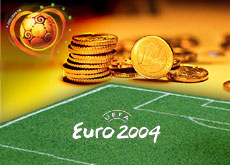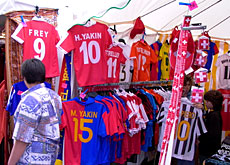Jackpot for European football

Whichever team lifts the Henry Delaunay trophy in Lisbon on July 4, there will already have been one winner: Uefa, European football’s governing body.
Euro 2004 is expected to generate income of more than SFr1 billion ($770 million), and the Swiss-based organisation stands to bank just under half of it.
Some of the tournament’s huge receipts will flow into the pockets of players; national football federations can also look forward to a decent windfall.
But it is Uefa, based in Nyon in western Switzerland, which will be helping itself to the biggest slice of a rich financial cake.
Led by its longstanding president Lennart Johansson, the football body has certainly played a canny game. But Lady Luck has also played her part.
Cash windfall
The television rights for the tournament – which account for more than two-thirds of revenue – were sold four years ago at a time when media organisations were flush with cash and football was prime real estate.
Television is paying SFr800 million for the right to broadcast matches – a far cry from the SFr6.9 million earned by Uefa during the 1988 European Championships in West Germany.
The Swiss Broadcasting Corporation – swissinfo’s parent company – has so far refused to disclose how much it paid to televise Euro 2004. But neighbouring Austria, which did not qualify for the finals, shelled out SFr8.3 million.
Including ticket sales, Uefa expects to reap SFr1.2 billion from the 12th edition of the European Championships. But where will all this money go?
It is costing around SFr150 million to organise and stage the three-week event; a little over SFr200 million is destined for each of the 16 teams in the final phase; and around SFr500 million will be divided up among Uefa’s 52 member associations.
The remaining SFr400 million will head straight into Uefa’s coffers.
Win bonus
The Swiss team – even if they head for an early bath after the group stage – will also not be leaving Portugal empty-handed.
To begin with, the players didn’t ask for bonuses from the Swiss Football Association. But when they learned that Uefa had given the national body SFr7.5 million, they changed tack.
Anyone who played in all the qualifiers will have already banked SFr129,000.
If the team make it though to the quarter-finals (by finishing first or second in their group), each player will receive SFr80,000. They will also earn SFr10,000 a head for each point the team wins.
Wins against Croatia, England and France would see each player pocket SFr170,000.
Third place brings SFr30,000 (plus SFr10,000 for each point scored), while even the wooden spoon in the group is worth SFr20,000.
Agreement has yet to be reached between the players and the Swiss Football Association on bonuses for reaching the semi-finals or even the final.
During the tournament, each team will pick up SFr1 million for a win and SFr500,000 for a draw.
Portugal
And what, if any, will be the financial rewards for the host country?
The decision to build six new stadiums and revamp four others – to ensure all the match venues satisfied the minimum 30,000 capacity required by Uefa – didn’t go down too well with some Portuguese.
Questions were asked about how the new stadiums would be profitable once the curtain falls on Euro 2004.
There are no clubs playing in Portugal’s top division in the vicinity of the Algarve stadium, between Faro and Loulé in the south of the county.
And critics say 15,000-seater stadiums would have sufficed in Leira and Coimbra.
Lisbon now has two major football stadiums, as does Porto; while those in Braga and Guimarães are only 20 kilometres apart.
The stadium costs have been entirely borne by Portugal. The government has contributed up to 23 per cent, with the regional authorities paying the rest – apart from in Porto and Lisbon where the grounds are privately owned.
swissinfo, Doris Lucini

In compliance with the JTI standards
More: SWI swissinfo.ch certified by the Journalism Trust Initiative

You can find an overview of ongoing debates with our journalists here. Please join us!
If you want to start a conversation about a topic raised in this article or want to report factual errors, email us at english@swissinfo.ch.